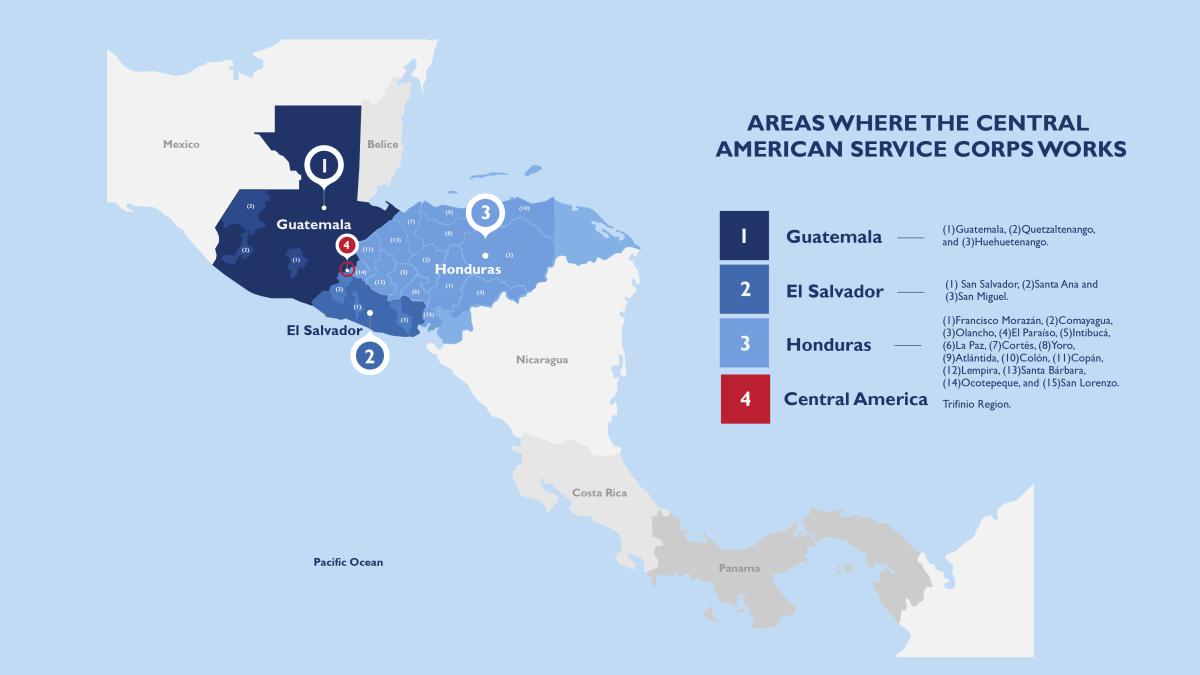
Guatemala - 1) Guatemala, 2) Quetzaltenango, 3) and Huehuetenango.
El Salvador - 1) San Salvador, 2) Santa Ana and 3) San Miguel.
Honduras - 1) Francisco Morazán, 2) Comayagua, 3) Olancho, 4) El Paraíso, 5) Intibucá, 6) La Paz, 7) Cortés, 8) Yoro, 9) Atlántida, 10) Colón, 11) Copán, 12) Lempira, 13) Santa Bárbara, 14) Ocotepeque, and 15) San Lorenzo.
Central America - Trifinio Region.

A Gen Now Youth Impact Leader program participant engages with Guatemala school-aged children.
Guatemala
“The opportunity to volunteer with the Central American Service Corps has made me more committed to making a difference in the lives of others.” - CASC participant Mariana Alejandra, from Quetzaltenango, Guatemala
Central American Service Corps programs in all northern Central America countries provide youth with meaningful community service opportunities and job skills training so they can find opportunities at home. USAID/Guatemala’s programming under the initiative is no exception.
The National Youth Service model, developed through diverse local stakeholder engagement and robust evidence-based learning, is the foundation for CASC efforts in the country. Based on lessons learned from this and other youth-focused activities, the governments of the U.S. and Guatemala launched the Jóvenes Con Propósito (Youth With Purpose) initiative in May 2024.
Jóvenes Con Propósito will give Guatemalan youth more alternatives to migration. Over the next five years, the USAID-funded program will expand nationally to reach 25,000 Guatemalan youth, providing them with job skills training, community service experiences, and opportunities to lead local investment in their communities. At the end of the program, youth will receive support to match them to job, education, or entrepreneurship opportunities, and encourage their continued civic engagement.
- CASC GUATEMALA SUCCESS STORIES
- English Fact Sheet
- Spanish Fact Sheet
- Guatemala Success Stories
- Videos - Overview, Phase 1, Phase 2, Phase 3
- Jovenes con Proposito website in English and Spanish
Honduras
“My dream isn’t in another country. I can dream here.” - CASC participant from Tegucigalpa, Honduras
In Honduras, CASC programming is grounded in USAID’s decades-long experience working with Honduran youth and local communities to ensure a positive transition to adulthood. That local knowledge informs the CASC approach to fostering youth-led community service that, in turn, opens doors to future employment.
USAID/Honduras will provide short-term professional and community development opportunities for 17,000 Honduran youth in areas such as the environment, education, and economic development. Such experiences will equip them with essential life and job skills to stay and invest in their future and in their communities.

Honduran youth celebrate the completion of their Leadership Program for Youth in Agriculture.

Katherine Sánchez, from El Salvador, participates in an electrical lineman course offered by the USAID Skills for Employment Project.
El Salvador
“This opens many doors for me and I feel that with this I will be able to move forward.” - Brenda, a participant in CASC’s Flexible Modalities program, which helps young Salvadoran people complete their high school studies.
Many Salvadorans face the difficult decision to leave their homes in search of better economic opportunities. To meet that challenge head on, USAID and local partner organizations reach at-risk young men and women in areas with high crime rates and few employment options.
With private sector and civil society support, USAID will offer 12,000 Salvadoran youth job readiness and placement services to help them meet local workforce needs. In exchange, those participants will lead service projects where they live.
To deepen community connections as a counterweight to migration, USAID is also working with local CASC partners to provide volunteer opportunities to an additional 3,600 youth. Through service-learning experiences, young people feel more rooted in community, are elevated as changemakers, and are less likely to migrate.
- CASC EL SALVADOR SUCCESS STORIES
- CASC EL SALVADOR PROGRAM FACT SHEETS
Central America Regional
Young people are the present and future of all northern Central America – a belief that drives all CASC efforts, including those led by USAID’s Central America Regional Mission based in El Salvador.
CASC will soon implement a multi-country program to provide short-term professional development opportunities for youth from communities across the Trifinio region, home to a vital forest ecosystem where the borders of El Salvador, Guatemala, and Honduras meet.
Modeled after the U.S. Forest Service Youth Conservation Corps, the program will give participants the opportunity to develop technical expertise in forest management, nature conservation, watershed protection, and climate change adaptation. Combined with service-learning activities, mentoring, and peer network support, the hands-on experience will prepare youth to enter the workforce and address the region’s conservation challenges.
CASC programming led by USAID’s Central America Regional platform will launch soon. Please check back for success stories.
